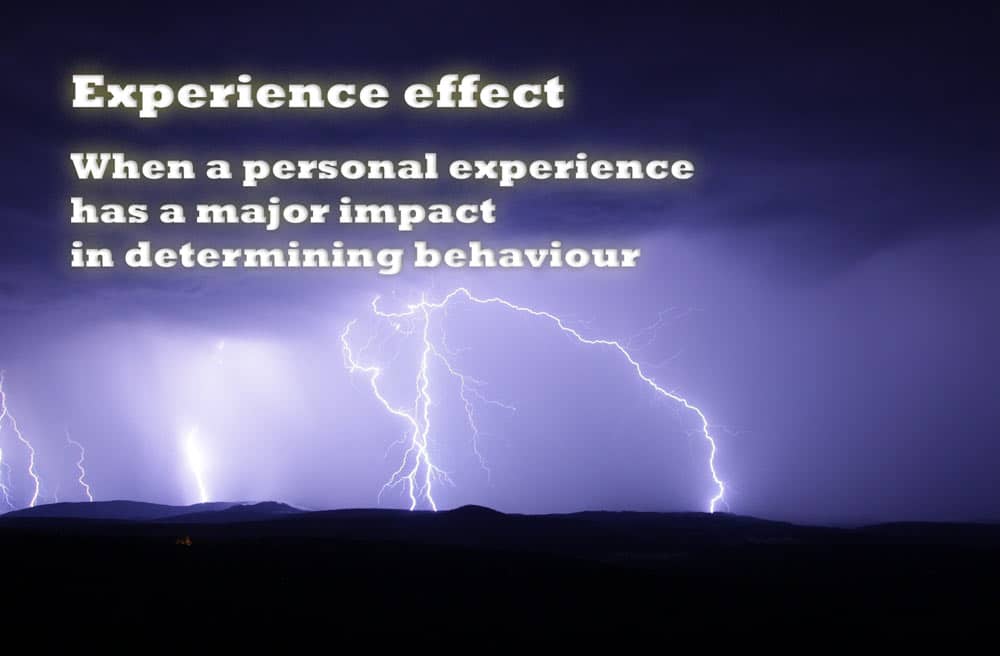Definition of experience effects
When a single personal experience has a profound impact on future decisions by individuals.
Example of experience effects
1. Bad experience never use the company again. A friend of mine was on an American Airlines flight when the wings caught fire. They had to make an emergency landing. As a result, he never flew on American Airlines again. (He said it was hard to fly ever again) This is a classic example of the experience effect. One powerful experience and changes consumer behaviour.
A rational consumer may take a different view. If they are concerned about the safety of an airline, they would look at the industry average safety record for different airlines. If all airlines are averaging 99.9% safety, then it doesn’t make any difference which airline you took. Therefore, even though you had a bad experience on American Airlines, you would view it as a statistical freak and no reason to change your decision making.
However, only a minority of consumers would instinctively look at average statistical safety records, the more pressing impact on your behaviour is the experience you personally had. Neuroscience suggests that direct personal experience have a much bigger impact in rewiring our brain neurons than industry-wide reports and statistics.
2. Covid perspective. Another example, if a person catches Covid, but doesn’t have any ill effects, they may assume the whole Covid situation is overblown and there is no reason to have any mask mandates or vaccines. Their view of Covid is coloured by their own personal experience. Equally, someone who has a close family member die of Covid may become very concerned about Covid in society. It is hard to detach from our very personal and immediate experiences and look at the wider picture. What happens to us, is not necessarily a good guide to the wider picture.
Experience effects in Finance
Ulrike Malmendier examined the experience effect in finance. For example, individuals who lived through the Great Wall Street Crash of 1929 were less likely to buy stocks and shares. Individuals who lived through the boom years of 1950s and 60s are much more likely to buy shares. “the stock-market participation of the generation that experienced the 1930s Great Depression as teenagers or young adults is, at 13%, less than half of later cohorts.” (p 19. “Experience Effects In Finance: Foundations, Applications, And Future Directions, 2021 pdf)
When taking decisions most recent experiences have bigger effects. e.g. a prolonged boom in housing may help us to forget past busts (1991 and 2007)
She found four key takeaways
- The long-lasting imprint of past experiences on beliefs and risk-taking.
- Recency effects – We value recent experiences much more
- The domain-specificity of experience effects. This means if we have a bad experience in shares we will become risk-averse in buying shares. However, we may be willing to take great risks in other areas, such as buying bonds or real estate – where our experience is positive.
- Imperviousness to information that is not experience-based. This means that we place very little weight on the work of experts. We value our own personal experience more than impersonal data. Malmendier found this applied not just to ordinary people but also to professionals. She claims even Central Bankers base their inflation prediction on their personal experiences rather than wider considerations.
Implications of experience effects
- It can be hard to change opinions through the use of experts. Michael Gove’s famous dictum in the UK Brexit referendum “We’ve had enough of experts” This is why when trying to encourage certain behaviours it is best to express personal experiences that people can relate to.
- Firms wish to avoid those negative experience effects which could put consumers off for life. Even loyal consumers can be put off by a single bad negative experience. Firms try to reach out to consumers to prevent immediate bad reviews but give the opportunity to rectify the experience for the consumer.
- Investors are prone to personal bias. If an investor has recent experience of good returns in one area, there is always the risk of irrational exuberance, ignoring past experiences that they were not involved in. Even professionals can ignore warning signs such as price to earnings ratios.
- ‘Covid experience’ causing disruptions in the labour market. In the discussion of why workers are quitting their jobs post-Covid, experience effects played a role. The very different experience of working from home, not commuting made people re-evaluate what kind of job they wanted. Once you have had the experience of staying at home, it changes your thinking and made some reluctant to return to the office. Covid – why workers are quitting.
Related
Malmendier, Ulrike “Experience Effects In Finance: Foundations, Applications, And Future Directions”, July 2021 NBER working paper pdf)

